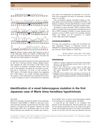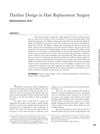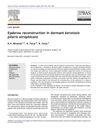 April 2023 in “Dermatologica Sinica”
April 2023 in “Dermatologica Sinica” Sex hormones affect hair growth and loss, and treatments for related hair diseases include various medications, hair transplantation, and light therapy.
 October 2022 in “BMC genomics”
October 2022 in “BMC genomics” RNA editing significantly affects hair growth and follicle cycling in the Tianzhu white yak.
 July 2022 in “Journal of the Dermatology Nurses' Association”
July 2022 in “Journal of the Dermatology Nurses' Association” The document encourages attending the 2023 Dermatology Nurses' Association Convention.
 June 2022 in “Authorea (Authorea)”
June 2022 in “Authorea (Authorea)” Efficient delivery systems are needed for the clinical use of CRISPR-Cas9 gene editing.

Hidradenitis Suppurativa has genetic links, with certain gene mutations more common in patients and a third of cases having a family history.
April 2020 in “BMC endocrine disorders” A woman with childhood growth hormone deficiency had multiple hormone deficiencies and developed serious lung and kidney problems later in life.
November 2019 in “BMC veterinary research” The hair loss in Belgian Blue crossbred calves was caused by a diet issue, not by disease or infection.
 January 2015 in “Indian Journal of Dermatology, Venereology and Leprology”
January 2015 in “Indian Journal of Dermatology, Venereology and Leprology” The document concludes that various skin conditions have specific characteristics and treatments, and highlights the importance of vitamin D in managing these dermatological issues.

Men with hair loss are seen as less attractive and shorter, and height is a key factor in attractiveness ratings.
August 2022 in “Precision Clinical Medicine” JAM-A helps hair regrowth in alopecia areata by protecting VCAN in skin cells.
July 2005 in “Indian Journal of Dermatology” 3 citations,
January 2021 in “Journal of dermatology & cosmetology” Current alopecia treatments manage symptoms but don't cure, and better treatments are needed.
 7 citations,
May 2010 in “Journal of Cutaneous Pathology”
7 citations,
May 2010 in “Journal of Cutaneous Pathology” A new genetic area linked to a rare hair loss condition was found on chromosome 13 in a Chinese family.
 6 citations,
January 2013 in “The Journal of Dermatology”
6 citations,
January 2013 in “The Journal of Dermatology” Researchers found a new genetic mutation causing a rare hair loss condition in the first Japanese child studied.
 December 2020 in “مجله كليه طب الكندي”
December 2020 in “مجله كليه طب الكندي” Alopecia, or hair loss, can be caused by genetics, illness, or certain drugs, and can be treated with synthetic or natural medications.
 1 citations,
January 1967 in “The BMJ”
1 citations,
January 1967 in “The BMJ” The document concludes that while some hair and scalp disorders can be treated, hair loss from destroyed follicles is permanent, and damaged hair can only regrow naturally.
5 citations,
January 2016 in “Open Journal of Regenerative Medicine” Myoblast transplantation shows promise for treating various muscle and heart conditions.
 January 2017 in “Journal of traditional medicine & clinical naturopathy”
January 2017 in “Journal of traditional medicine & clinical naturopathy” Combining trichology and homeopathy is effective for diagnosing and treating hair loss.
 May 2018 in “European Journal of Dermatology”
May 2018 in “European Journal of Dermatology” The first Japanese family with Marie Unna hereditary hypotrichosis showed hair condition improvement in a child and highlighted the risk of misdiagnosis.
 21 citations,
October 2019 in “The journal of investigative dermatology/Journal of investigative dermatology”
21 citations,
October 2019 in “The journal of investigative dermatology/Journal of investigative dermatology” A specific gene change plus an additional mutation in the same gene cause hereditary trichilemmal cysts.
 16 citations,
November 1992 in “Journal of International Medical Research”
16 citations,
November 1992 in “Journal of International Medical Research” ViviScal®, a food supplement, was found to be highly effective in treating hereditary hair loss in young males, while fish extract showed no impact.
 7 citations,
January 1990 in “Clinical and Experimental Dermatology”
7 citations,
January 1990 in “Clinical and Experimental Dermatology” Hair loss gradually happens, and minoxidil helps regrow hair.
 1 citations,
January 2006 in “Elsevier eBooks”
1 citations,
January 2006 in “Elsevier eBooks” The conclusion is that different types of hair loss in dogs and cats can be cosmetic or serious, and affected animals should not be bred.
 14 citations,
October 2020 in “Natural Products and Bioprospecting”
14 citations,
October 2020 in “Natural Products and Bioprospecting” Various treatments, including FDA-approved drugs, natural products, and oral supplements, can help with hair loss, but a patient's medical history and potential allergies should be considered when choosing a treatment.
February 2023 in “Current Pharmaceutical Design” Natural remedies like certain plants can help reduce hair loss and promote hair growth.
5 citations,
July 2017 in “International journal of endocrinology and metabolism/International journal of endocrinology and metabolism.” Two siblings with a genetic mutation had a form of rickets that doesn't respond to vitamin D.
 2 citations,
December 2003
2 citations,
December 2003 Saw palmetto is an effective natural treatment for hair loss with minimal side effects.
91 citations,
January 2010 in “Journal of Allergy and Clinical Immunology” NK cells play a role in skin diseases like eczema and psoriasis.
 25 citations,
November 2008 in “Facial Plastic Surgery”
25 citations,
November 2008 in “Facial Plastic Surgery” Dr. Michael Beehner recommends a personalized, careful approach to hairline design in hair replacement surgery for a natural look.
 6 citations,
July 2011 in “Journal of Plastic Reconstructive and Aesthetic Surgery”
6 citations,
July 2011 in “Journal of Plastic Reconstructive and Aesthetic Surgery” Eyebrow reconstruction using hair follicle grafts was successful in a man with a benign hereditary disorder affecting his eyebrows.





















